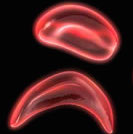 Scientists at the University of Connecticut, Yale University, Harvard University, and the Massachusetts Institute of Technology have developed a new method of detecting sickle cell disease that can be used in remote areas that do not have advanced medical technology.
Scientists at the University of Connecticut, Yale University, Harvard University, and the Massachusetts Institute of Technology have developed a new method of detecting sickle cell disease that can be used in remote areas that do not have advanced medical technology.
The researchers have invented a small, lightweight platform that can be attached to a smartphone. A few drops of blood can be placed in the box and an analysis can be made using magnetic levitation to determined if the blood donor has the sickle cell trait. Using the smartphone’s camera, a display is show on the device’s screen allowing the operator to determine if the blood sample has sickle-shaped blood cells. While anyone can have sickle cell disease, it is far more common in people of African descent.
Stephanie Knowlton, a graduate student at the University of Connecticut who has been involved in the research, stated that “rather than sending a sample to a lab and waiting three days to find out if you have this disease, with this device you get on-site and portable results right away. We believe a device like this could be very helpful in third world countries where laboratory resources may be limited.”











